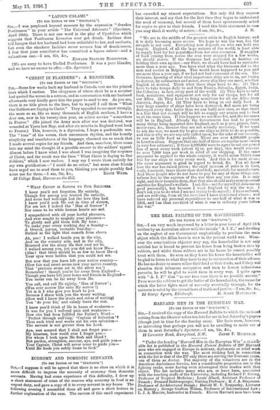" WRIST IN FLANDERS " : A REJOINDER.
[TO THE EDITOR OF TUB " SPECTATOR."] Srn,—Some few weeks back my husband in Canada sent me the printed lines which I enclose. The clergyman of whose choir he is a member had quoted the verses in a sermon, and in conversation with my husband afterwards very kindly gave him the paper to send to me. As you see, there is no title given to the linos, but to myself I call them " What Our Soldiers are Saying to Christ." They appealed to me most strongly, the more so as, like so many thousands of English mothers, I have a dear son, now in his twenty-first year, on active service " somewhere in France." (Ho joined the Army soon after war was declared, was wounded at Ypres last May, and after six months in England went back to France.) This, however, is a digression, I hope a pardonable one. The " tone" of the verses, their uncommon rhythm, and the homely simplicity and trustfulness of the language, charmed me so much that I made several copies for my friends. And then, somehow, there came into my mind the thought of a possible answer to the soldiers' appeal. Almost before I knew. what I was about I was imagir.ing the response of Christ, and the result was the lines " What Christ is Saying to Our Soldiers," which I now enclose. I may say I wrote them entirely for my own gratification—" I could do no other," but some close friends have urged me to send them to you, thinking you might possibly find some use for them.—I am, Sir, &c., EDITH WOOD. 36 College Road, Harrow-on-the-Hill.
" WHAT CDRIST IS SAYING TO OBE SOLDIERS.
I knew you'd not forgotten Me entirely, Though few among you trusted Me entirely, And some had well-nigh lost the love they had. I knew you'd seek Me out in time of sorrow, For am not I indeed the Man of Sorrow' ? Nor cease to be while human hearts are sad.
I sympathized with all your lawful pleasures, And ever sought to magnify your pleasures— To glorify and gild them with My love : To make your every working day a Sunday— A blessed, joyous, veritable Sun-day- Bathed in the light that cometh from above.
Ali, yes ! I walked beside you in the city, And on the country side, and in the city, Mourned o'er the many ills that need not be. I walked among you, yet you did not know Me— (Alas 1 that there should be so few to know Me--) Your eyes were holden that you could not see.
But now that you have left your native country— (How fair and sweet seems now your native country, That precious stone set in the silver sea ') Remember ! though you're far away from England— Though you have left your home and friends in England— You never can be far away from Me.
You call, and call Me rightly, Man of Sorrow' ; (Was ever sorrow like unto My sorrow ?) Yet is it I who give you heart to jest Because I share with you the weary waiting. (How well I know the strain and stress of waiting) You do your bit,' and calmly leave the rest.
I knewyou'd think of Me in hours of weakness— It was for you I suffered pain and weakness— How else had been fulfilled. the Father's Word- ' Perfect through suffring," Captain of Salvation ' ? Thus each tried soul works out his own salvation— The servant is not greater than his Lord.
Aye, rest assured that I shall not forget you— My kinsmen, how could ever I forget you— For whom I took upon Me flesh and blood ? But pardon, strengthen, succour, aye, and guide you— Your Captain, Christ will never cease to guide you— Until He leads you safely home to God."


























 Previous page
Previous page